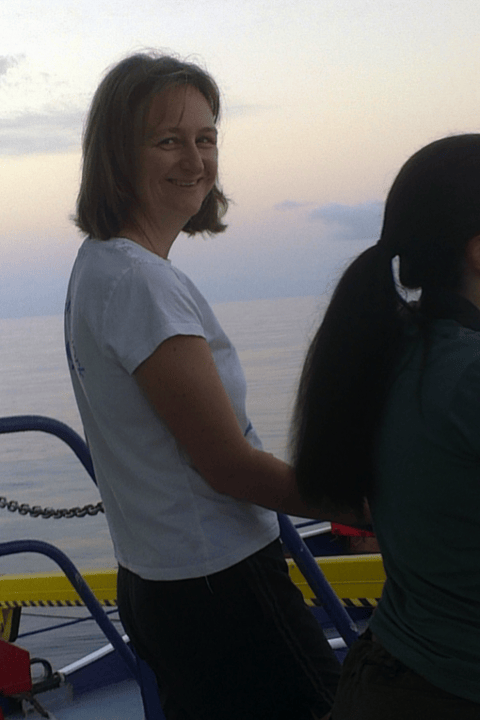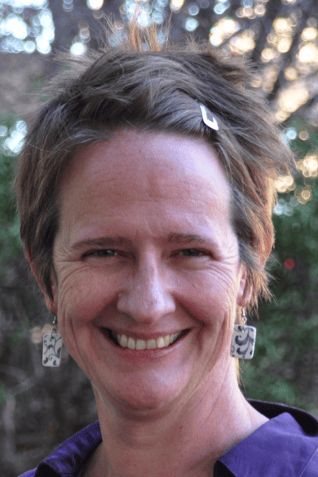 Rebecca Cowley, at sea.
Rebecca Cowley, at sea.Two energetic and extraordinarily knowledgeable scientists from Australia have worked tirelessly for years to help us better quantify our changing climate. Dr. Susan Wijffels and Rebecca Cowley are a complementary team that has dramatically improved ocean measurements and set a standard for quality.
As I’ve written before, “Global Warming” is, in truth “Ocean Warming.” The vast majority of the extra energy that enters our climate system ends up in the oceans. But measuring the long-term increase in ocean heat is a major challenge. First, we need accurate measurements that can tell us how much energy is contained in the waters. Second, we need those measurements to be made for years and decades so that long-term trends can be identified.
So how would someone measure the vast oceans? Well, over the past century or so, a comprehensive measurement system has evolved from buckets, to mechanical devices, to bottles, until our modern Argo float system. But as the measurement methods change over time, they introduce uncertainty and potential biases in the archived data. Without understanding the past accuracies and biases, we cannot quantify the long-term increase in ocean heat content. And this is where Dr. Wijffels and Cowley come in.
While both Susan and Rebecca are extremely busy, between writing papers, planning new scientific studies, arranging oceanographic cruises, or deploying ocean instrument, I was able to get some of their time to learn more about them. I asked these scientists a few questions to learn more about their background, what motivated them to get into science in general and oceanography in particular.
Rebecca Cowley studied aquatic biology and chemistry at Deakin University in Australia. She moved to the climate-science group CSIRO as a hydrochemist and spent years as a sea-going nutrient/oxygen/salinity chemist. There, she built her programming and quality control skills and found that she could transfer these new skills to oceanography. Her unique combination of skills, of chemical and physical oceanography along with computer programming and data quality, was much needed by the climate community. Now, she spends much of her time at sea collecting data and working with international collaborators to improve the quality of historical data for other researchers.
 Rebecca Cowley, at sea.
Rebecca Cowley, at sea.
One of her most impactful contributions to the field is her leading role on data quality. How do we know that the information collected across the Earth’s climate are accurate? What standards can be put in place to ensure continued high quality data? What impact does measurement accuracy have on our emerging understanding of climate? These are the questions she asks and answers.
When I asked her about her background, she told me,
I became a scientist because I liked solving problems and balancing chemical equations. The most fun I had at school when I was in the lab doing experiments. Science was exciting and different and not many people went into science degrees. I didn’t get into physical oceanography immediately, gradually developing and changing my skills. There were no obvious aha moments, but I did know what I didn’t enjoy doing and naturally moved away from that and got better at what I did enjoy doing.
I also asked what advice she might give the next generation of scientists. Her response was,
Be flexible and find work that you enjoy. Don’t expect that what you start out doing will be what you end up doing.
I asked similar questions to Dr. Wijffels, Research Oceanographer at CSIRO in Australia. She has a BS with honors in Earth Sciences and a PhD in physical oceanography. She told me that she has always been interested in science. Way back as a child, she avidly read science magazines which her mother acquired. She specifically remembers reading about the different climates on various planets and the importance of the ocean in making our planet hospitable. By the time she was in high school, she knew she wanted to be an oceanographer.
 Dr. Susan Wijffels.
Dr. Susan Wijffels.
I wanted to know if she has had any “aha” moments. She said absolutely. In fact, very recently with her student Paul. They discovered a “beautiful and repeating pattern of long-term salinity change in each of the ocean basins.” It turns out they are ocean fingerprints both of long-term warming but also water-cycle intensification.
Dr. Wijffels has worked on many key oceanographic areas in her career. Some of the most important contributions she has made was on understanding the Indonesian Throughflow. She has also made great contributions to changes and patterns in the oceans. In fact, her research has forced her to dig into old oceanographic data; she has become a bit of a historical archivist.
Posted by John Abraham on Friday, 26 December, 2014
 |
The Skeptical Science website by Skeptical Science is licensed under a Creative Commons Attribution 3.0 Unported License. |